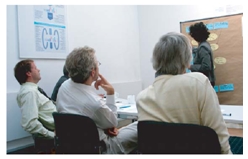Forschung / Research
The two main research foci of the hydrology group are:
- Methods for transdisciplinary knowledge integration and participatory processes
- Global water modelling
Methods for transdisciplinary knowledge integration and participatory processes
 To address societal problems at the interface of humans and environment and to identify sustainable management options, knowledge and problem perspectives of multiple actors need to be taken into account. Participatory processes have to be done for, e.g., developing strategies for climate change adaptation or mitigation or a sustainable land and water management. In transdisciplinary research, knowledge of multiple scientific disciplines and of stakeholders from outside of academia needs to be integrated. We investigate the optimal design of participatory processes and transdisciplinary research, using methods like actor modeling, Bayesian Networks and scenario generation that have the potential to enhance social learning and knowledge integration.
To address societal problems at the interface of humans and environment and to identify sustainable management options, knowledge and problem perspectives of multiple actors need to be taken into account. Participatory processes have to be done for, e.g., developing strategies for climate change adaptation or mitigation or a sustainable land and water management. In transdisciplinary research, knowledge of multiple scientific disciplines and of stakeholders from outside of academia needs to be integrated. We investigate the optimal design of participatory processes and transdisciplinary research, using methods like actor modeling, Bayesian Networks and scenario generation that have the potential to enhance social learning and knowledge integration.
Current projects
-
Supporting risk assessment and adaptation at multiple spatial scales: Co-development of methods for utilizing uncertain multi-model based information on freshwater-related hazards of climate change (CO-MICC).
Sub-project: Design for co-development of suitable methods, global hydrological modeling and coordination. -
Auswirkungen des Klimawandels auf aquatische Ökosysteme und Wasserversorgung im Biosphärenreservat Rhön: Partizipative Risikobewertung und Entwicklung von Anpassungsmaßnahmen (KlimaRhön)..
Teilprojekt: Analyse der potentiellen Auswirkungen des Klimawandels auf die Wasserressourcen sowie transdisziplinäre Wissensintegration und Entwicklung von Anpassungsmaßnahmen im Biosphärenreservat Rhön -
REGULATE - Regulation of Groundwater in Telecoupled Social-Ecological Systems.
Subproject: Quantity – Availability and Uncertainty
Global water modelling
 Modelling of water resources and water use at the global scale supports a sustainable management of water, food and energy in a globalized world. In addition, it helps to understand the Earth system as water transport and storage variations on the continents plays an important role for atmospheric processes, global biogeochemical cycles, sea level and the gravity field. We are continuously improving and applying our global hydrology and water use model WaterGAP to quantify the current water resources situation and to derive interesting scenarios of the future, with a focus on assessing climate change risks. We strive to develop meaningful indicators for problems such as water scarcity, drought or alteration of freshwater biota habitat.
Modelling of water resources and water use at the global scale supports a sustainable management of water, food and energy in a globalized world. In addition, it helps to understand the Earth system as water transport and storage variations on the continents plays an important role for atmospheric processes, global biogeochemical cycles, sea level and the gravity field. We are continuously improving and applying our global hydrology and water use model WaterGAP to quantify the current water resources situation and to derive interesting scenarios of the future, with a focus on assessing climate change risks. We strive to develop meaningful indicators for problems such as water scarcity, drought or alteration of freshwater biota habitat.
Current projects
- Towards a sustainable utilization of the global hydrological modelling software WaterGAP (ReWaterGAP)
- Securing biodiversity, functional integrity and ecosystem services in DRYing riVER networks (DRYvER)
-
Understanding the global freshwater system by combining geodetic and remote sensing information with modelling using a calibration/data assimilation approach (GlobalCDA) (DFG research unit coordinated by Petra Döll, Frankfurt, and Jürgen Kusche, Bonn)
Subproject: Advancing global-scale hydrological modeling and the understanding of the global freshwater system by model development and calibration/data assimilation -
Supporting risk assessment and adaptation at multiple spatial scales: Co-development of methods for utilizing uncertain multi-model based information on freshwater-related hazards of climate change (CO-MICC).
Sub-project: Design for co-development of suitable methods, global hydrological modeling and coordination




